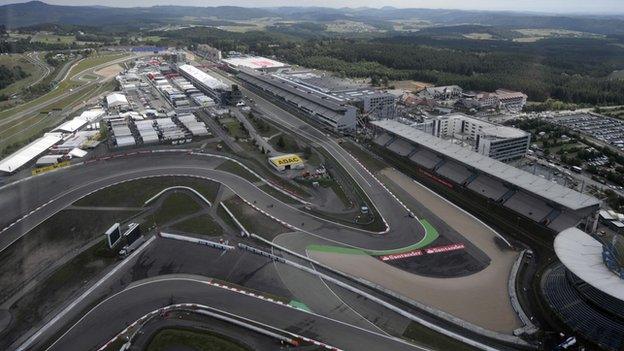German GP: 'Close racing and overtaking' at the Nurburgring
- Published

Tyres, tyre, tyres. The black rubber is the hot topic of conversation heading into this weekend's German Grand Prix following a series of failures at last Sunday's British Grand Prix.
Pirelli have changed the construction of the tyres for this weekend in an attempt to ensure the blowouts are not repeated at the Nurburgring, which hosts round nine of the Formula 1 World Championship.
Remarkably, reigning world champion Sebastian Vettel - one of four German drivers on the grid - has never won his home race. In fact, he's never won a race in July in 12 attempts. Will it be 13th time lucky for the championship leader and three-time world champion?
Mercedes may have something to say about that. The German team are on form, having won two of the last three races, and arrive at the Nurburgring with their first real chance of victory on home soil for close to 50 years.
The track
Formula 1 only has the pleasure of visiting the Nurburgring once every two years as the venue has a deal to alternate the German Grand Prix with Hockenheim.
The original Nurburgring Nordschleife circuit, at 20.8km long with 1,000ft of elevation changes, was nicknamed "The Green Hell" by three-time world champion Sir Jackie Stewart and considered to be the most daunting and dangerous piece of racing track in existence.
Now, the teams race on a modest, but fast and flowing, 15-turn 5.148km track, built to modern safety standards, next door. The mix of corners makes set-up tricky, while many corners are cambered which allows the drivers to carry more speed into them.
The Schumacher S is the fastest chicane on the circuit, with drivers entering the corner at 258 kph in sixth gear. The best overtaking spot is at the final second-gear chicane.
The venue
Located in the heart of the Eifel mountains, the original Nurburgring hosted in the inaugural German Grand Prix in 1951.
Since then, the venue has hosted the German Grand Prix 25 times. Hockenheim (33) and Avus (once) are the only other circuits to have done so.
In years when both Hockenheim and the Nurburgring have hosted a Formula 1 race, the latter venue has held the race under the European Grand Prix banner (12 times) and Luxembourg Grand Prix (twice).
It wasn't until 1976, when Niki Lauda suffered a near-fatal crash at the Nordschleife, that the original track was dropped from the calendar. Circuit officials began building a brand new circuit and the venue opened in 1984.
What the drivers say
Red Bull's Sebastian Vettel: "I've always had a lot of fun on this track. In 2009, I made it to the podium for the first time in Formula 1, when we got a one-two, and it was a fantastic experience thanks to the German fans."
Sauber's Nico Hulkenberg: "Since 2005 I have driven numerous races in several categories there, and, as far as I can remember, I won a race in every category. Although this is my third season, I have never raced at the Nurburgring in a Formula 1 car, so this is a first for me."
McLaren's Jenson Button: "The Nurburgring is a track that seems to encourage close racing and plenty of overtaking. The combination of low- and medium-speed corners tend to allow cars to run quite closely, and there are a couple of big braking zones, where it's quite easy to get alongside and steal the inside line."
Lotus's Kimi Raikkonen: "You need good traction out of the corners and a stable car under braking. We're pretty reasonable in both these areas. We have had our issues with cooler weather and unfortunately it's not usually that warm at the Nurburgring, but we'll just see what we get and get on with it."
Williams' Pastor Maldonado: "It's one of the most technical circuits on the calendar and we have been working hard to improve our cars' balance in slow, technical corners. Tyre degradation is likely to be high as well."
A classic German GP
They say you always remember your first and for Red Bull's Mark Webber that was the 2009 German Grand Prix, when the Australian secured his first Formula 1 triumph.
"That has got to be my best memory from that circuit by far and one of the best of my whole career," said Webber. "It was such a special day and to win it in the style that we did that day was incredible."
Starting from pole, the Australian's race got off to a bad start when he aggressively swept across the track and tapped the Brawn of Rubens Barrichello in defence of his position.
The stewards took a dim view of the move and handed him a drive-through penalty. Crucially, Red Bull left him out as long as they could before bringing him in to serve the penalty. That enabled him to rejoin in the lead and in clear air.
From then, he pumped in the lap times before making his first pit stop, and though he rejoined eighth, the Australian had the pace to climb up the field and secure the win in his 130th start, eight years after making his F1 debut.
- Published3 July 2013
- Published3 July 2013
- Published2 July 2013